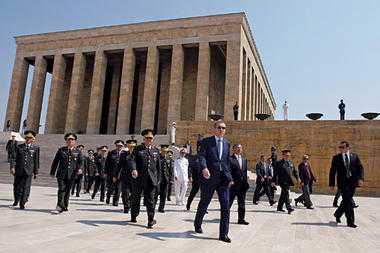By Alexander Christie-Miller, Correspondent / August 5, 2011
Istanbul

When Turkish Prime Minister Recep Tayyip Erdogan accepted the resignations of his four most senior military officers on July 29, he savored a victory unprecedented in Turkey’s modern history: Whenever the government and army had squared off before, politicians had been the ones to go.
Related stories
* Turkey coup plot: What’s behind the tumultuous identity crisis
* Turkey coup plot: 12 officers charged as government takes on military
* Turkish leaders meet to dispel coup plot tensions
But amid celebration of the military’s defeat as a waymark of democracy, little scrutiny has been given to allegations that fabricated evidence and the framing of suspects played a role in its downfall.
The military’s chief of general staff, Isik Kosaner, said in his parting statement that it was “impossible” to continue serving due to his inability to protect the legal rights of some 250 officers detained for a range of alleged antigovernment plots.
Many of them have been held for more than a year without trial, and publicly available papers relating to the plots reveal significant inconsistencies.
RELATED: How Turkey’s military upheaval will affect NATO
The main document detailing an alleged 2003 coup plot code-named “Sledgehammer,” included in an indictment leaked by both prosecution and defense, refers to an organization that was not founded until two years later.
And the timing of many of the arrest warrants and charges has fueled claims that the probes are politically motivated. They are often filed in the lead-up to Supreme Military Council meetings such as this week’s, meetings at which the government and army have clashed over military promotions.
Separately, scores of journalists, academics, and others are involved in mass trials for involvement in an alleged deep state network. Hundreds of Kurdish politicians and activists have also been detained as part of a sprawling antiterror investigation.
“This is not about whether you’re pro-military or antimilitary, it’s about the rule of law,” says Asli Aydintasbas, a columnist at the daily Milliyet newspaper. “Do we want to live in a country where political opponents are eliminated by trials that are unconvincing? I find it very disturbing.”
But many Turks have scant sympathy for a military that for decades brutalized its own people and overthrew four governments as self-appointed guardian of the secular state forged by Mustafa Kemal Ataturk.
“I’m not going to say that the deficiencies in due process is the main aspect in [the Sledgehammer] case,” says Sahin Alpay, a columnist for Today’s Zaman newspaper. “It’s helping to put an end to the political role of the armed forces.”
Confrontation between AKP, military
Turkey’s long history of military intervention in civilian rule began in 1960, when the army overthrew Prime Minister Adnan Menderes, who was then tried before a kangaroo court and executed.
After seizing power again in 1971, it staged a third coup in 1980, detaining 650,000 people. Of them, 230,000 were tried, 14,000 stripped of citizenship, 50 executed, and 171 killed in custody.
via Turkey’s military defanged: Is it good for democracy? – CSMonitor.com.

Leave a Reply